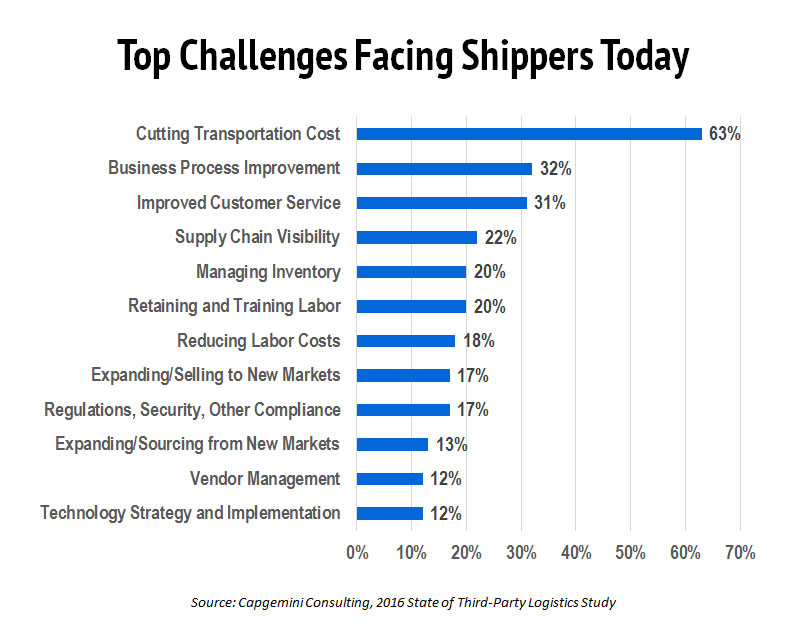
by logisticsplus | Jul 12, 2016 | News
 According to the 2016 State of Third-Party Logistics Study by Capgemini, the chart shown here presents some of the top logistics challenges facing shippers today. Not surprisingly, a majority of the study’s respondents indicated “cutting transportation cost” as a top challenge. Beyond that, many respondents identified less obvious pain-points, but important considerations nonetheless. As the study indicates, shippers are demanding greater innovation and technology advances while simultaneously remaining cost-conscious.
According to the 2016 State of Third-Party Logistics Study by Capgemini, the chart shown here presents some of the top logistics challenges facing shippers today. Not surprisingly, a majority of the study’s respondents indicated “cutting transportation cost” as a top challenge. Beyond that, many respondents identified less obvious pain-points, but important considerations nonetheless. As the study indicates, shippers are demanding greater innovation and technology advances while simultaneously remaining cost-conscious.
Outsourcing all or a portion of your transportation to a third-party logistics (3PL) company – like Logistics Plus – is one way shippers are addressing many of these challenges. 3PLs can often provide the required expertise, people, capacity, warehousing and IT systems needed to help shippers reduce transportation expenses, improve supply chain visibility, manage inventory more effectively, and achieve regulatory compliance.
If your business is facing any of these challenges, Logistics Plus can help.
Cutting Transportation Cost
With 20 years of expertise, and a $135 million client-portfolio, Logistics Plus is able to leverage its size, strength and experience to secure highly discounted rates for ground, air, ocean, and rail transportation services. Since we are viewed as a reliable, large-sized shipper ourselves, the rates we secure are often better than what small or medium shippers would be able to secure on their own; and with a letter of authorization, we can even help large shippers negotiate the best rates on their behalf.
Business Process Improvement
With our 4PL or managed transportation solutions, we work as an extension of your team to identify the weakest links in your supply chain, and then we help you repair them. From planning and strategy to services and options – we’ll help you streamline your supply chain so that you can focus on what you do best – manufacture and sell great products.
Improved Customer Service and Supply Chain Visibility
Our technology solutions, like eShipPlus and eWorldPlus, provide visibility to your products both domestically and internationally. Greater visibility leads to a more predicable experience and improved customer service. Our caring professionals will also ‘go-to-bat’ for you when problems occur to ensure the best possible outcomes for you and your customers.
Managing Inventory
We manage and operate dozens of warehousing facilities around the world. In the United States, we have West Coast, Southwest, Midwest and Northeast facilities with the capacity and expertise to manage both industrial and retail inventories (including Fulfillment By Amazon). Our WMS technology provides complete visibility throughout the entire process. You only source the space you need, the time you need it, and where you need it – nothing more.
Retaining and Training Labor and Reducing Labor Costs
As an extension to your team, we provide the skilled and trained logistics specialists you need – and we scale them according to your demand. That keeps your labor costs low and your headcount variable for when you need it most.
Expanding/Selling to New Markets and Expanding/Sourcing from New Markets
With 400+ employees working in 20 different countries around the world (and additional agents in virtually every country), we have the local knowledge and expertise you need to import, export, and transact globally. On the sourcing side, we can help you with services such as purchasing, expediting and inventory management. We can identify the product, negotiate the price, purchase it, ship it and deliver it to your door: truly one-stop shopping!
Regulations, Security, Other Compliance
Our full-service compliance department can quickly identify your needs, contain costs, and minimize your risk. Our customs specialists help you comply with existing government regulations and stay ahead of changing customs compliance laws to reduce your risk, eliminate errors, and lower your costs.
Vendor Management
Reducing inbound shipping costs is one of the easiest, yet most overlooked ways to reduce your overall transportation spend. Vendors applying a “prepaid-and-add” approach to your purchase orders may be costing you more money than you realize for inbound transportation. Logistics Plus can help you take control of your inbound orders by creating updated routing requests and shipping instructions, monitoring carrier compliance, and then consolidating and auditing all of your freight invoices.
Technology Strategy and Implementation
Our transportation and cargo management platforms are easy-to-use and can be fully integrated with your back office systems. EDI, API, or web services – our technology professionals will be able to recommend the right strategy and implementation plan for your situation.
So what’s YOUR logistics challenge? We want to know. Just click the button below and tell us your most pressing transportation or logistics challenge. Our talented and caring professionals will work with you to provide a customized solution that addresses the logistics challenges that YOU are facing today.

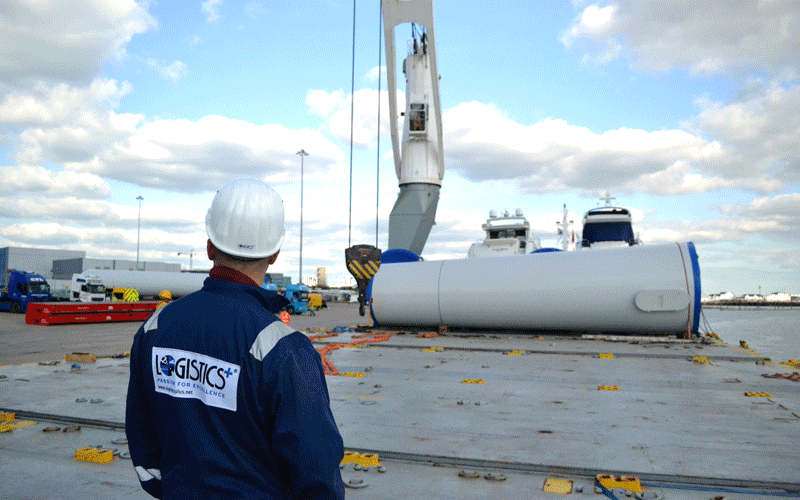
by logisticsplus | Jul 8, 2016 | News
Here’s a quick ‘play-by-play’ example of how the Logistics Plus (LP) global project cargo team springs into action when presented with a logistics challenge from one of our customers. Now that’s global project logistics teamwork!

| 26.05 |
The LP Belgium office received a call from our customer to urgently send lifting lugs to Turkey (which then led to a request to ship 18 windmill tower sections from Turkey to the United Kingdom). Bahadir Erdil and Basar Kandil (from LP Turkey) happened to be in Antwerp, so it was set in motion fast. |
| 27.05 |
Hilde Van De Woestyne arranged for the pick up in the Netherlands. |
| 29.05 |
The lifting lugs fly from Amsterdam to Istanbul. |
| 30.05 |
Basar is back in Turkey and initiates custom clearance. |
| 01.06 |
Basar arranges delivery to wind tower manufacturer. |
| 06.06 |
Frederik Geirnaert gets the RFQ for the shipment of 18 windmill tower sections (4100 cbm). |
| 07.06 |
Bahadir spends the next few days negotiating with various carriers to find the first available ship at the best rates. |
| 09.06 |
We get the order! |
| 10.06 |
Mert Altinsaray arranges trucking of first pieces from supplier. He also attends load-out in-person and makes some repairs/fixes. |
| 23.06 |
Mert arranges trucking for final pieces from supplier. Meanwhile Bahadir is at the Izmir port to supervise loading. |
| 24.06 |
Mert and Bahadir finalize loading. Doruk Yagci finalizes the documents. |
| 05.06 |
Ship arrives in Southampton, England. Frederik attends the discharging. Shipment is successfully delivered to its final destination! Had the shipment not arrived on time, the customer would have missed an important deadline – it needed to ship one set of completed towers from Southampton by July 6th at 9:00 am or they would have missed a police escort; and the next possibility for that police escort was 6 weeks later! |
If you have a project logistics challenge of your own, let us know. The LP team stands ready to help you too!

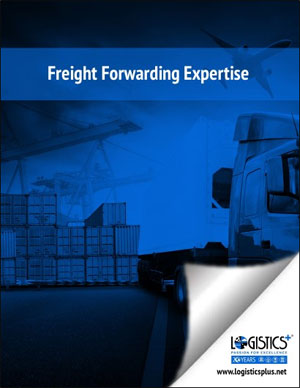
by logisticsplus | Jul 6, 2016 | News
 A freight forwarder, forwarder, or forwarding agent is a person or company that organizes shipments for individuals or corporations to get goods from the manufacturer or producer to a market, customer or final point of distribution. When it comes to international freight forwarding, selecting the right global freight forwarder can help your business succeed by offering relief to many of your supply chain challenges – and possibly even providing you with a competitive advantage. Your freight forwarder should be an experienced and trusted partner for your logistics needs. Increasing levels of global sourcing and omnichannel retailing have created significant opportunities for importers and exporters around the world to optimize their supply chains. Whether you’re with a large, multinational corporation, or a small company shipping globally for the first time, selecting the right global freight forwarding partner can help you save time and money, increase shipment speed and visibility, and reduce your risk.
A freight forwarder, forwarder, or forwarding agent is a person or company that organizes shipments for individuals or corporations to get goods from the manufacturer or producer to a market, customer or final point of distribution. When it comes to international freight forwarding, selecting the right global freight forwarder can help your business succeed by offering relief to many of your supply chain challenges – and possibly even providing you with a competitive advantage. Your freight forwarder should be an experienced and trusted partner for your logistics needs. Increasing levels of global sourcing and omnichannel retailing have created significant opportunities for importers and exporters around the world to optimize their supply chains. Whether you’re with a large, multinational corporation, or a small company shipping globally for the first time, selecting the right global freight forwarding partner can help you save time and money, increase shipment speed and visibility, and reduce your risk.
Here are six (6) questions to ask when choosing a global freight forwarder:
- Can they provide capacity options across multiple shipping modes? They should be able to ship goods by ocean, air, rail or ground, choosing the best option for your need. They should also be able to consult you on consolidation and routing optimization options.
- Do they offer customs brokerage and trade compliance advice? They should be able to leverage customs information and programs to your advantage. They must be knowledgeable in free trade agreements and know how to navigate each country’s compliance requirements, customs rules, governmental regulations, and duty rates.
- Do they have regional offices in key geographic regions? Your global freight forwarder should have deep knowledge of the local countries in which you are importing or exporting. They should be familiar with local languages, infrastructure, economy, currencies, tax laws, and tariffs. They should also be members of reputable freight forwarding networks, such as WCA, IFLN, or TWIG. If a freight forwarder is a member of a reputable network, the chances of them handling your shipment with care and diligence anywhere in the world is higher than if they were not a member. It also shows they have financial strength because there are only a handful of legitimate, quality freight forwarding networks that really vets their members.
- Is their TMS or cargo management systems truly global? There should be one system architecture that works across all regions of the world and covers all types of transportation. Shipment tracking and visibility should be accessible online or, if needed, it should be something you can integrate it into your back office systems.
- Can they help assess and reduce cargo risk? They must adequately assess and mitigate cargo risk to help your company protect its bottom line. They should have adequate cargo insurance and they should be able to issue added insurance policies for your shipments in case of theft, damage, or loss.
- Do they have the experience you need? There are many modes of transport, commodities, regulations, and industries. Your freight forwarder should be able to demonstrate experience handling important freight forwarding shipments for other reputable companies, or those in similar industries.
If you’re looking for a new global freight forwarding partner, you might consider asking these six questions as part of your screening process. We’d be honored if you’d consider Logistics Plus as a potential candidate to be your global partner. Please ask us these same six questions and we’re confident you’ll be satisfied with our answers. Click the first button below to contact us today for more information, or click the second button below to request an international freight quote. You can also click the image shown above to view or download a PDF copy of our Freight Forwarding Expertise brochure.


by logisticsplus | Jun 28, 2016 | News
FOR IMMEDIATE RELEASE
Logistics Plus Named to Supply & Demand Chain Executive’s SDCE 100 Top Supply Chain Projects
Massive cargo project involving the import and transport of large gas pipes earns award
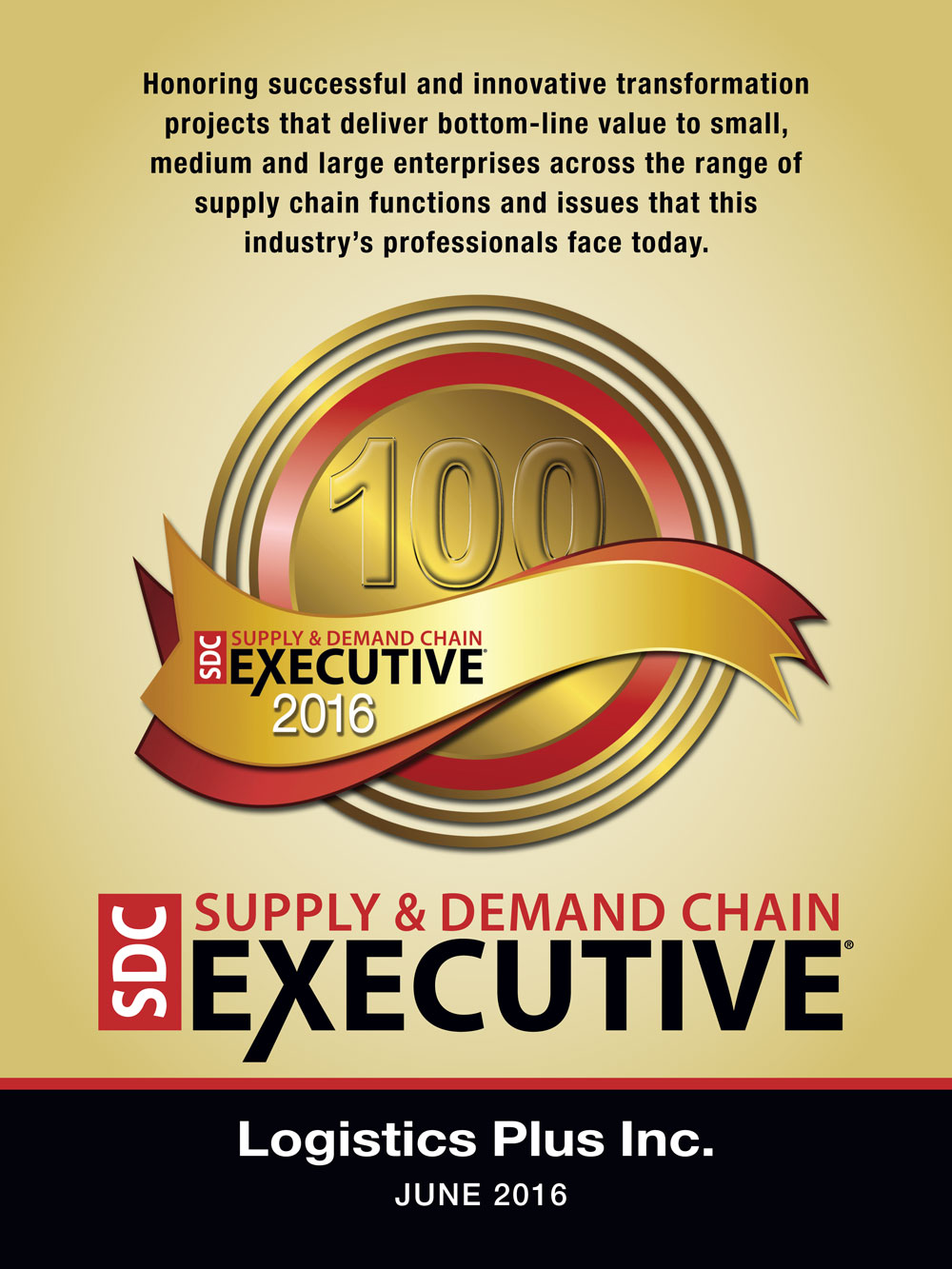 ERIE, Pa. (June 28, 2016) – Logistics Plus Inc., a leading worldwide provider of transportation, logistics and supply chain solutions, is proud to announce it has been selected by Supply & Demand Chain Executive, the executive’s user manual for successful supply and demand chain transformation, as a recipient of an “SDCE 100” Award for 2016.
ERIE, Pa. (June 28, 2016) – Logistics Plus Inc., a leading worldwide provider of transportation, logistics and supply chain solutions, is proud to announce it has been selected by Supply & Demand Chain Executive, the executive’s user manual for successful supply and demand chain transformation, as a recipient of an “SDCE 100” Award for 2016.
The SDCE 100 is an annual list of 100 great supply chain projects. These projects can serve as a guide for supply chain executives who are looking for new opportunities to drive improvement in their own operations. These projects show how supply chain solution and service providers help their customers and clients achieve supply chain excellence and prepare their supply chains for success. The supply chain project submitted by Logistics Plus that earned this recognition involved the import coordination and final delivery, last summer, of nearly 2,500 sections of 40’ and 60’ pipes from Germany to various locations in the Midwest region of the United States.
“Our goal with 2016’s SDCE 100 is to shine the spotlight on successful and innovative transformation projects that deliver bottom-line value to small, medium and large enterprises across the supply chain,” says Ronnie Garrett, editor of Supply & Demand Chain Executive. “The selected projects can serve as a roadmap for supply chain executives looking for new opportunities to drive improvement in their own operations. We congratulate all of our winners for a job well done!”
“This is an awesome award for our project cargo division,” said Jim Berlin, founder and CEO of Logistics Plus. “We handle a lot of pretty cool logistics projects for major companies all around the world. We give our employees plenty of internal accolades, but oftentimes the great work they do on these projects goes ‘unsung’ to the outside world. In this case, it’s nice to see some well-deserved external recognition for another challenging cargo project successfully completed.”
About Supply & Demand Chain Executive
Supply & Demand Chain Executive is the executive’s user manual for successful supply and demand chain transformation, utilizing hard-hitting analysis, viewpoints, and unbiased case studies to steer executives and supply management professionals through the complicated, yet critical, world of supply and demand chain enablement to gain competitive advantage. Visit them on the web at www.SDCExec.com.
About Logistics Plus Inc.
Logistics Plus Inc. provides freight transportation, warehousing, global logistics, and supply chain management solutions through a worldwide network of talented and caring professionals. Founded in Erie, PA by local entrepreneur, Jim Berlin, 20 years ago, Logistics Plus is a fast-growing and award-winning transportation and logistics company. With a strong passion for excellence, its 380+ employees put the “Plus” in logistics by doing the big things properly, and the countless little things, that together ensure complete customer satisfaction and success.
The Logistics Plus® network includes offices located in Erie, PA; Alma, AR; Little Rock, AR; Los Angeles, CA; Riverside, CA; San Francisco, CA; Visalia, CA; Atlanta, GA; Chicago, IL; Detroit, MI; Kansas City, MO; Charlotte, NC; Lexington, NC; Buffalo, NY; Cleveland, OH; Charleston, SC; Greenville, SC; Nashville, TN; Dallas, TX; Fort Worth, TX; Houston, TX; Laredo, TX; Madison, WI; Bahrain; Belgium; Canada; Chile; China; Colombia; Egypt; France; Germany; India; Indonesia; Kazakhstan; Libya; Mexico; Poland; Saudi Arabia; Turkey; and UAE; with additional agents around the world. For more information, visit www.logisticsplus.com or follow @LogisticsPlus on Twitter.
Media Contact:
Scott G. Frederick
Vice President, Marketing
Logistics Plus Inc.
(814) 240-6881
scott.frederick@logisticsplus.com
Click image below to download the Logistics Plus logo:

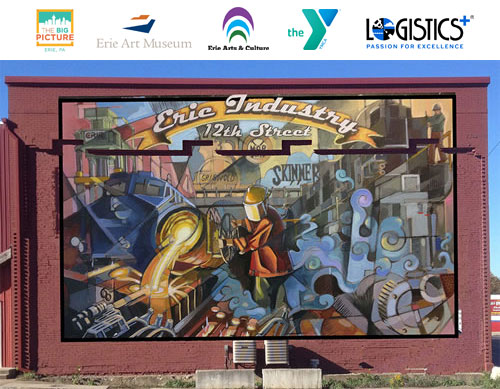
by logisticsplus | Jun 27, 2016 | News
 ERIE, PA (June 27, 2016) – Artist Ehren Knapp has installed a new public mural at 337 West 12th Street on the east side of the former Skinner Engine building, which is now owned and operated as a commercial warehouse facility by Logistics Plus Inc. The mural entitled “Erie Industry” represents a sampling of Erie’s manufacturing legacy along 12th Street.
ERIE, PA (June 27, 2016) – Artist Ehren Knapp has installed a new public mural at 337 West 12th Street on the east side of the former Skinner Engine building, which is now owned and operated as a commercial warehouse facility by Logistics Plus Inc. The mural entitled “Erie Industry” represents a sampling of Erie’s manufacturing legacy along 12th Street.
The mural, a project of The Big Picture, covers approximately 25’ x 44.75’ on the east wall of the warehouse and 192 sq. ft. of surface area on retaining blocks. Knapp spent the winter months working in his studio painting on a polytab material.
The Big Picture project recently held a free paint day for the Erie Industry mural at the Erie Art Museum. Community members of all ages were invited to paint on the polytab that was eventually installed on the cement blocks in front of the Skinner Engine building. Ehren Knapp led the workshop and provided the design, paints and instructions for the activity. The Downtown YMCA Teen Center has also been involved with the project; photographing existing murals, participating in the paint day and painting the cement block murals.
“The skyline in the mural represents facades of a few distinct buildings along 12th Street and the foreground depicts the Skinner plant as its façade may have looked in the 40s, the central structure is the skywalk west of Cherry street, and in the central left background is the ramped roof line of Erie Press,” said Knapp in his response to The Big Picture’s request for proposals. “Starting at the left middle ground, Erie manufacturing is represented by a green hydraulic press from Erie Press, a locomotive represents GE, and foundry and casting images depict Urick Ductile Solutions. The central figure symbolizes the labor force. The Skinner Engine Company is represented with the Unaflow Steam Engine in the right of the composition. The sun in the center background will be subtlety symbolic of Griswold Cast Iron.”
“Logistics Plus has always tried to ‘spruce up’ Erie–our home for the past 20 years,” said Jim Berlin, Founder & CEO, Logistics Plus. “We purchased and cleaned up historic Union Station in 2003 and placed 50 flags at the top of the building. At the time, we had about 35 employees in the station; now we have nearly 100, and have added many tenants. We painted the bridges over Peach and Sassafras Street and brightened up the gateways to and from downtown. We put a mural on the old Dana Brake building after buying that, and in 2014 we purchased the old Skinner Engine building, turned it into a warehouse, and now, along with The Big Picture, we’re commemorating its proud history with another beautiful mural. We’re also supporters of the Erie Lightway Project being led by Erie Council Member, David Brennan. All of these projects have a common purpose – to improve Erie’s image, encourage development and create a stronger sense of pride in the local community.”
The Big Picture is a collaborative effort between the Erie Art Museum, Erie Arts & Culture, and the YMCA with support from Tungsten Creative Group. The goal is to provide resources and support to artists and property owners interested in the creation of murals. It’s an idea that was first considered in 2012 when Erie was chosen as the host city for the Governor’s Awards for the Arts.
The Big Picture leverages the power of visual storytelling to inspire and beautify neighborhoods by placing large-scale murals in public places. “Noticeably, there is an organic effort in many of our neighborhoods to use murals to beautify, brand a space, inspire community conversation and build pride,” says John Vanco, director of the Erie Art Museum. “The Big Picture provides the organizational framework to leverage human capital, financial resources and expand impact.”
The Governor’s Awards for the Arts organizers have designated $35,000 for The Big Picture. The seed money will fund project management, training and technical assistance for artists and property owners and support the creation of up to six new murals.
Logistics Plus Inc. is a leading worldwide provider of transportation, logistics and supply chain solutions. Based in Erie, PA, with offices all around the world, the Company is celebrating its 20th anniversary this year.
####
The Big Picture Media Contact:
Tammy Roche
Vice President, Financial Development, Membership & Marketing
YMCA of Greater Erie
(814) 566-9597
troche@ymcaerie.org
Logistics Plus Inc. Media Contact:
Scott G. Frederick
Vice President, Marketing
Logistics Plus Inc.
(814) 240-6881
scott.frederick@logisticsplus.com
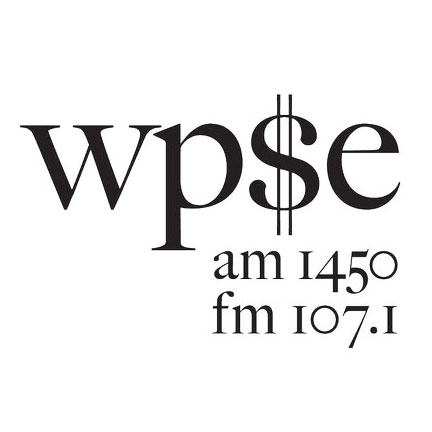
by logisticsplus | Jun 22, 2016 | News
 Logistics Plus media partner, WP$E radio, continues to air short audio clips from Jim Berlin and others within the company as part of its business programming. WP$E AM 1450/FM 107.1 is a commercially licensed radio station serving Erie County, Pennsylvania. The station is owned by the Penn State Board of Trustees, and it is operated by Penn State Behrend, under the direction of professional broadcast staff. In addition to providing a one-stop source for global and financial news, WP$E also airs ongoing commentaries from regional business leaders.
Logistics Plus media partner, WP$E radio, continues to air short audio clips from Jim Berlin and others within the company as part of its business programming. WP$E AM 1450/FM 107.1 is a commercially licensed radio station serving Erie County, Pennsylvania. The station is owned by the Penn State Board of Trustees, and it is operated by Penn State Behrend, under the direction of professional broadcast staff. In addition to providing a one-stop source for global and financial news, WP$E also airs ongoing commentaries from regional business leaders.
Presented here are a few recent audio clips covering our Amazon Solutions Provider Network announcement. Additionally, the last audio clip covers the growing demand for our eShipPlus freight management tools. The comments were provided by Scott Frederick, vice president of marketing for Logistics Plus (click image to listen):

Identifying Amazon global retailer needs

Partnering with Amazon to be a solutions provider

Providing warehousing solutions to retailers

Providing value-added retailer solutions

eShipPlus Transportation Management System

 According to the 2016 State of Third-Party Logistics Study by Capgemini, the chart shown here presents some of the top logistics challenges facing shippers today. Not surprisingly, a majority of the study’s respondents indicated “cutting transportation cost” as a top challenge. Beyond that, many respondents identified less obvious pain-points, but important considerations nonetheless. As the study indicates, shippers are demanding greater innovation and technology advances while simultaneously remaining cost-conscious.
According to the 2016 State of Third-Party Logistics Study by Capgemini, the chart shown here presents some of the top logistics challenges facing shippers today. Not surprisingly, a majority of the study’s respondents indicated “cutting transportation cost” as a top challenge. Beyond that, many respondents identified less obvious pain-points, but important considerations nonetheless. As the study indicates, shippers are demanding greater innovation and technology advances while simultaneously remaining cost-conscious.





 ERIE, Pa. (June 28, 2016) – Logistics Plus Inc., a leading worldwide provider of transportation, logistics and supply chain solutions, is proud to announce it has been selected by Supply & Demand Chain Executive, the executive’s user manual for successful supply and demand chain transformation, as a recipient of an “SDCE 100” Award for 2016.
ERIE, Pa. (June 28, 2016) – Logistics Plus Inc., a leading worldwide provider of transportation, logistics and supply chain solutions, is proud to announce it has been selected by Supply & Demand Chain Executive, the executive’s user manual for successful supply and demand chain transformation, as a recipient of an “SDCE 100” Award for 2016.

